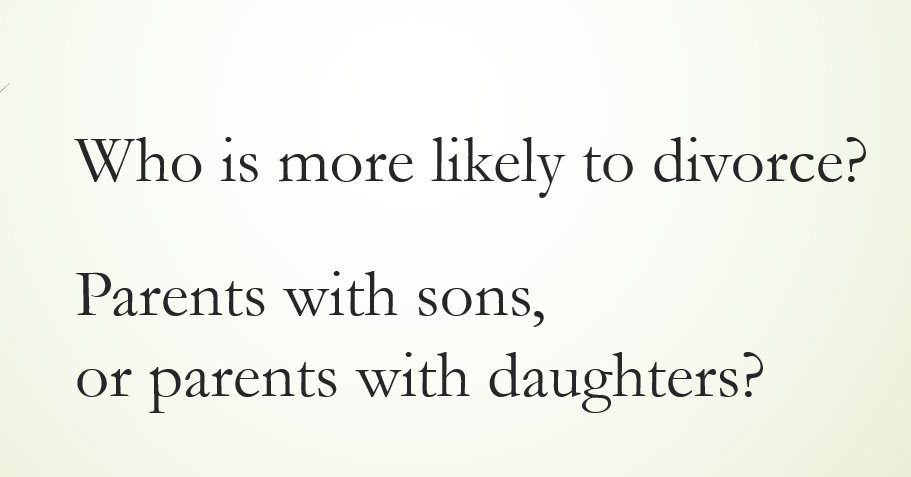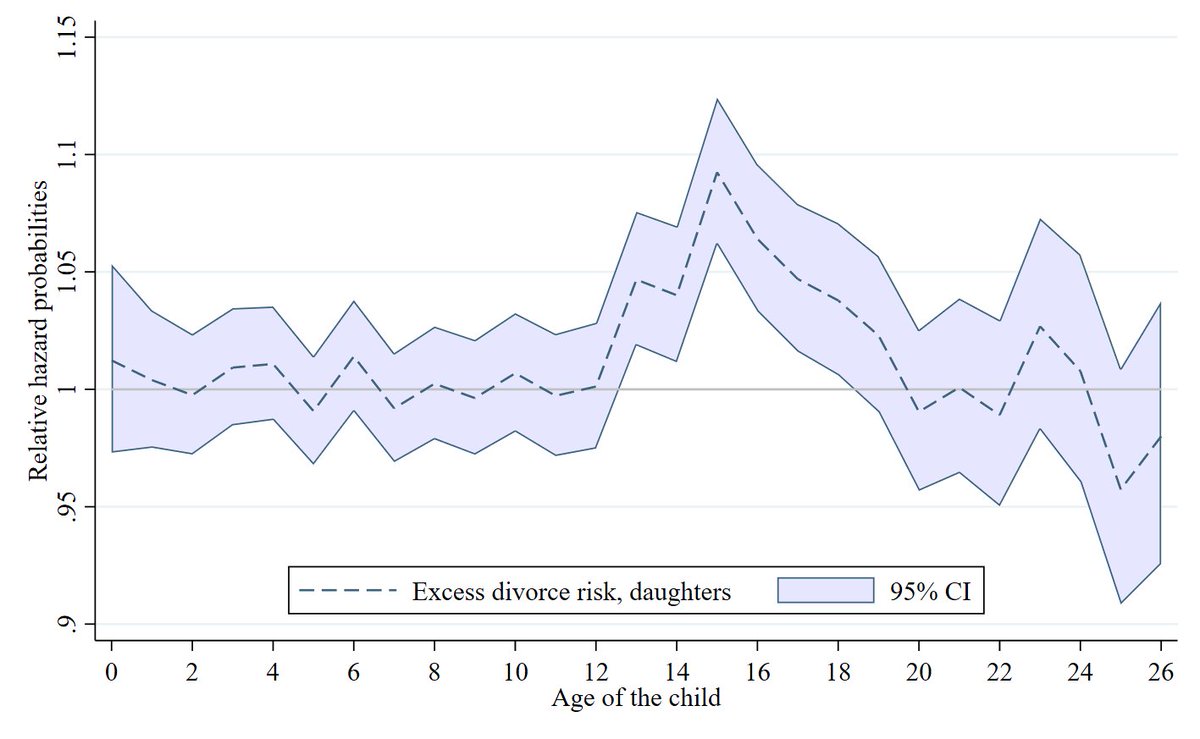I am excited to announce that my paper with @DavidCRibar, 'Daughters and Divorce' is now forthcoming in the Economic Journal @EJ_RES.
In this paper, we investigate whether and why does the gender of children influence parental risks of divorce.
(a thread)
In this paper, we investigate whether and why does the gender of children influence parental risks of divorce.
(a thread)
First, we should acknowledge many studies in sociology and economics that have been written on this topic.
The consensus is that parents with daughters face slightly higher divorce risks than parents with sons, although the European evidence is mixed at best.
The consensus is that parents with daughters face slightly higher divorce risks than parents with sons, although the European evidence is mixed at best.
We started working on this paper because we wanted to know why is this happening.
The commonly-invoked argument of 'son preference' (fathers of daughters are more likely to leave due to their latent need for a 'male heir') did not match our priors and so we took it to the data.
The commonly-invoked argument of 'son preference' (fathers of daughters are more likely to leave due to their latent need for a 'male heir') did not match our priors and so we took it to the data.
Using a Dutch population register of nearly 3 million marriages, we confirmed that parents in the Netherlands are more likely to divorce if their firstborn child is a girl.
Similar to earlier studies, the effect size is modest:
The divorce rate of families with firstborn daughters is 0.3 p.p. higher than the divorce rate of families with firstborn sons.
That being said, the magnitude increases with the number of daughters in the family.
The divorce rate of families with firstborn daughters is 0.3 p.p. higher than the divorce rate of families with firstborn sons.
That being said, the magnitude increases with the number of daughters in the family.
Our key contribution is to show that this effect is strongly age-specific, manifesting only among parents with teenage children.
During this period, the relative divorce risks of families with fb daughters become up to 10% (!) higher than those of families with fb sons.
During this period, the relative divorce risks of families with fb daughters become up to 10% (!) higher than those of families with fb sons.
And it's not only the Netherlands: We show that the very same pattern can be found in the U.S. data (CPS-MFS). The U.S. effects are about twice as strong as the Dutch effects.
The age-specificity is important, because it invalidates the standard son preference theory (fathers won't wait 13 years to act on their latent son preference).
Instead, it points to a more likely explanation: strained family relationships, possibly from gender-role conflicts.
Instead, it points to a more likely explanation: strained family relationships, possibly from gender-role conflicts.
Teenage years constitute a period when children become psychologically independent & improve their argumentation skills.
It is also the period when parental differences in gender roles become more salient, particularly when setting rules & boundaries for their teenage children.
It is also the period when parental differences in gender roles become more salient, particularly when setting rules & boundaries for their teenage children.
Supporting this reasoning, we show that the daughter effect is larger among parents whose children are likely to hold conflicting beliefs about gender roles
(e.g., immigrant parents or parents from earlier birth cohorts)...
(e.g., immigrant parents or parents from earlier birth cohorts)...
...and that the effect increases further if the parents themselves are likely to hold dissimilar gender-role beliefs
(e.g., parents with mixed immigration backgrounds).
(e.g., parents with mixed immigration backgrounds).
Perhaps most strikingly, we show that the effect is strongly dependent on father's sibship composition.
For fathers who grew up without any sisters, we see a strong daughter effect.
In contrast, for fathers who grew up with at least 1 sister, the effect disappears completely.
For fathers who grew up without any sisters, we see a strong daughter effect.
In contrast, for fathers who grew up with at least 1 sister, the effect disappears completely.
This suggests that men's childhood exposure to parental interactions with daughters can alleviate some of the conflicts that they may encounter down their own parenting road.
Here's the preprint: https://sites.google.com/site/kabatekjan/JKDR_Daughters_Preprint.pdf?attredirects=0&d=1
There's much more in the paper. We discuss alternative mechanisms, survey evidence, and we correct earlier U.S. estimates based on the CPS-MFS data.
Thanks for reading!
There's much more in the paper. We discuss alternative mechanisms, survey evidence, and we correct earlier U.S. estimates based on the CPS-MFS data.
Thanks for reading!


 Read on Twitter
Read on Twitter



